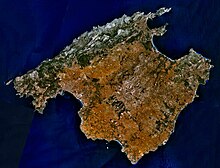Our website is made possible by displaying online advertisements to our visitors.
Please consider supporting us by disabling your ad blocker.
Muslim conquest of Majorca
| Muslim Conquest of Majorca | |||||||||
|---|---|---|---|---|---|---|---|---|---|
| Part of the Reconquista | |||||||||
 Satellite image of Majorca | |||||||||
| |||||||||
| Belligerents | |||||||||
| Byzantine Empire | Emirate of Córdoba | ||||||||
| Commanders and leaders | |||||||||
| Unknown | Issam al-Khawlani | ||||||||
| Strength | |||||||||
| Unknown | Unknown | ||||||||
| Casualties and losses | |||||||||
| Unknown | Unknown | ||||||||
The Conquest of Majorca by Muslim troops took place in 902 or 903. It was fought by the Emirate of Córdoba[1] and the Byzantine Empire who were besieged by the Muslims in the Castle of Alaró for eight years and five months.[2]
The emir Abdullah of Córdoba recognized the conquest and named Issam al-Khawlani governor of the island, a position he held from 904 to 912.
On this island [Majorca] there is a great fortress built on a high and desolate place, unequaled in the inhabited world; is known by the name of the Castell d'Alaró. The Majorcans say that when the island was conquered at the time of Muhammad, son of the fifth Ummaya amir in al-Andalus, the Rum became strong in this fortress for eight years and five months after the conquest, without anyone being able do anything against them; only the lack of groceries forced them to go out. This fortress stands on top of a hill of hard stone where there is an abundant spring.
The historiography debates about who were the rums that offered resistance, due to the polysemy of this word; on the one hand it could refer, in a restricted sense, to the Byzantine Empire or, in an extended sense, to the Christians, given that in 897, a papal bull made the islands dependent on the bishopric of Girona, showing the great weakness of the power structures, which have been greatly weakened by successive Muslim attacks.[4]
- ^ Amengual i Batle, Josep (1997). Guía para visitar los santuarios marianos de Baleares. Encuentro. p. 10. ISBN 847490434X.
- ^ Palos, J. C. (25 January 2020). "El puig d'Alaró, estendard de la resistència dels pobladors de Mallorca". Ara Balears. Retrieved 9 April 2020.
- ^ Barceló Perelló, Miquel (1975). "Comentaris a un text sobre Mallorca del geògraf al-Zuhri (s. VI-XII)". Mayurqa (14): 155-164.
- ^ Barceló Perelló, M. (1976). "La pretesa al·lusió a Mallorca i a Menorca en unes butlles dels papes Formòs (892) i Romà (897) al bisbe Servusdei de Girona". Annals de l'Institut d'Estudis Gironins, vol. 23. Girona: Institut d'Estudis Gironins. p. 247-255. ISSN 0213-6228. Retrieved 11 December 2010.
Previous Page Next Page


